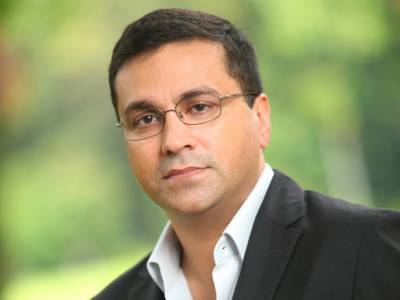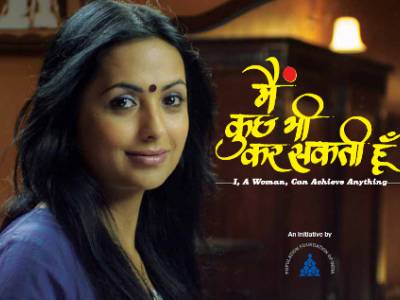Main Kuch Bhi Kar Sakti Hoon: Infotainment that transformed beliefs and outlook
Main Kuch Bhi Kar Sakti Hoon: Infotainment that transformed beliefs and outlook
· 52 episodes of Season One were telecast on television and radio last year. The series continues with Season Two currently aired on DD National every Saturday and Sunday at 7:30 pm.
· A recent study by an independent external agency shows that Season One changed people’s views substantially on early marriage, contraceptive use, domestic violence and the way they viewed women.
· The series was popular among the young. Half the married women who had watched the show were in the age group of 18-24 years. In fact, 40% of all respondents in the (18-24 years) had watched the show.
· The series had great impact on mothers-in-law. Earlier, only 59% of mothers-in-law were aware that it was illegal for a girl to marry before 18 years and for a boy before 21 years, which increased to 80% among those who watched the show.
· Similarly, earlier only 57% of mothers-in-law were aware that 21-25 years was the ideal age for a woman to have her first child. Among those who watched the show, this increased to 86%.
· The series had focused on the need for family planning and contraceptive use. The evaluation showed that -
Ø 92% men were now aware of modern family planning methods compared to 77% earlier. Similarly, 87% women were aware now, compared to 69% earlier, and 64% mothers-in-law were aware compared to 48% earlier.
Ø The series had helped in assuaging women’s fears of adverse side effects of modern contraceptives. Those who gave side effects as a reason for not using a modern contraceptives declined from 57% to 32%.
Ø Women who said they did not prefer modern methods declined from 35% to 13%.
Main Kuch Bhi Kar Sakti Hoon, an intervention launched by Population Foundation of India (PFI), revolutionized the portrayal of women on Indian television and radio with its synthesis of education and entertainment. Using a 360 degree approach that uses mass media, TV, radio, mobile, internet and community outreach, the serial entertains, provides knowledge and expounds ideal behaviors through its characters. Season 1 of the TV series is also being dubbed in 10 languages by Prasar Bharti and re-telecast in a total of 15 Doordarshan Regional Kendras.*[1]
A baseline, a midline qualitative assessment, and an end-line survey were conducted at the beginning, middle and end of Season One respectively in seven selected districts of Bihar and nine in Madhya Pradesh. The two states were chosen as they account for nearly 15% of India’s population, have high fertility rates and an unmet need for family planning. There is also an urgent need to increase the age of marriage and first birth, and knowledge of and access to quality family planning services in the two states.
The evaluation covered married and unmarried men and women, mothers-in-law and frontline health workers. It and aimed to assess the changes in their knowledge, attitude and practices (KAP) on family planning, child marriage, son preference, gender discrimination, domestic violence and sex selection.
The reach of the serial:
Ø As per Television Audience Measurement and Indian Readership Survey estimates, the serial was watched by over 58 million viewers
Ø 36% of TV owning households in the two states watched Season One: 42% in Bihar and 34% in Madhya Pradesh
Ø 72% of respondents in the endline evaluation who owned radios had watched the show
Ø Over six lakh phone calls were received on the Interactive Voice Response System from people across the country who wanted to engage on the issues the series had raised, and to share their own stories
Other significant changes
On early marriage, domestic violence
· Men too started seeing early marriage as leading to loss of opportunity. Their percentage jumped from only 2% to 31% by the end of Season One.
· Men began realizing domestic violence is not acceptable. Men who believed that women should be beaten on suspicion of unfaithfulness fell from 66% to 44% And those who believed that a woman should be beaten if she neglects the house and children fell from 49% to 28%
On family planning
Ø Awareness about different contraceptives for family planning grew in the communities
· On male sterilization, it increased from
o 77% to 92% among men
o 69% to 87% among women
o 48% to 64% among mothers-in-law
· On IUDs it rose from
o 40% among women in the baseline to 44% in the end line
· On male condoms from
o 71% among men in the baseline to 75% at the end line
Ø Those who felt that the next child would be healthier as a result of family planning rose from
o 31% to 38% for women
o 63% to 71% for men
o 31% to 39% mothers-in-law
The series had dwelt on empowerment of women, and their right to seek health care and plan their families.
Ø The percentage who were now confident of accessing family planning services rose from 47 to 59.
Ø Those who realized that it isn’t important to go on having children till a son is born increased from 43% to 57%.
Ø Those who believed that it is a women’s right to decide when to have children rose from 71% to 79%.
Ø There has been a positive shift in perception and attitudes towards women’s empowerment among women
o Those felt that once a girl is married, she can’t return to her parents’ home fell from 45% to 28%
o Those who believed that a man should have a final say in all family matters fell from 52% to 46%
o Those who felt that a man should remarry if his wife doesn’t give birth to a son fell from 51% to 45%.
PFI’s Executive Director, Poonam Muttreja said, “Reforming social norms and beliefs is not easy. But, there is a need to challenge preconceived notions, and the mass media plays a very important role in reaching out to the audience. This has been proven by the messages our viewers have shared with us over the Interactive Voice Response System (IVRS). This report emphasizes the role that the visual and the audio media plays in shaping beliefs. We have struck a chord with the people across the country, and with the Season Two currently being telecast, we endeavor to further this knowledge and improve the lives of our women and our people.”
Speaking about the impact of the series, a respondent at a Focus Group Discussion in Bihar said, “Other serials show child marriage but not how to stop it and why it should not be allowed. I like the approach of Main Kuch Bhi Kar Sakti Hoon.” Another female health worker stated, “Main Kuch Bhi Kar Sakti Hoon is different. The greatness of a girl is shown, and that of her father, who is a teacher. He educates her very well...I think we should follow his footsteps.”















Share
Facebook
YouTube
Tweet
Twitter
LinkedIn